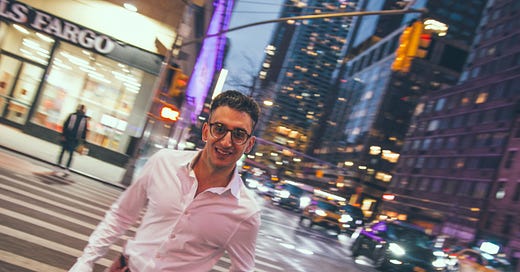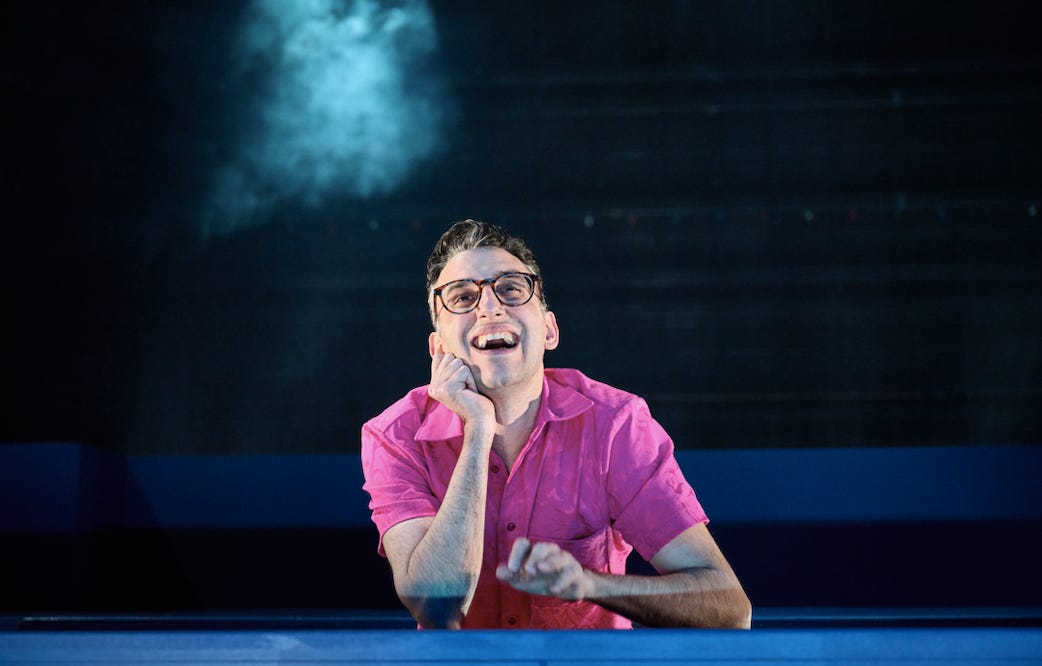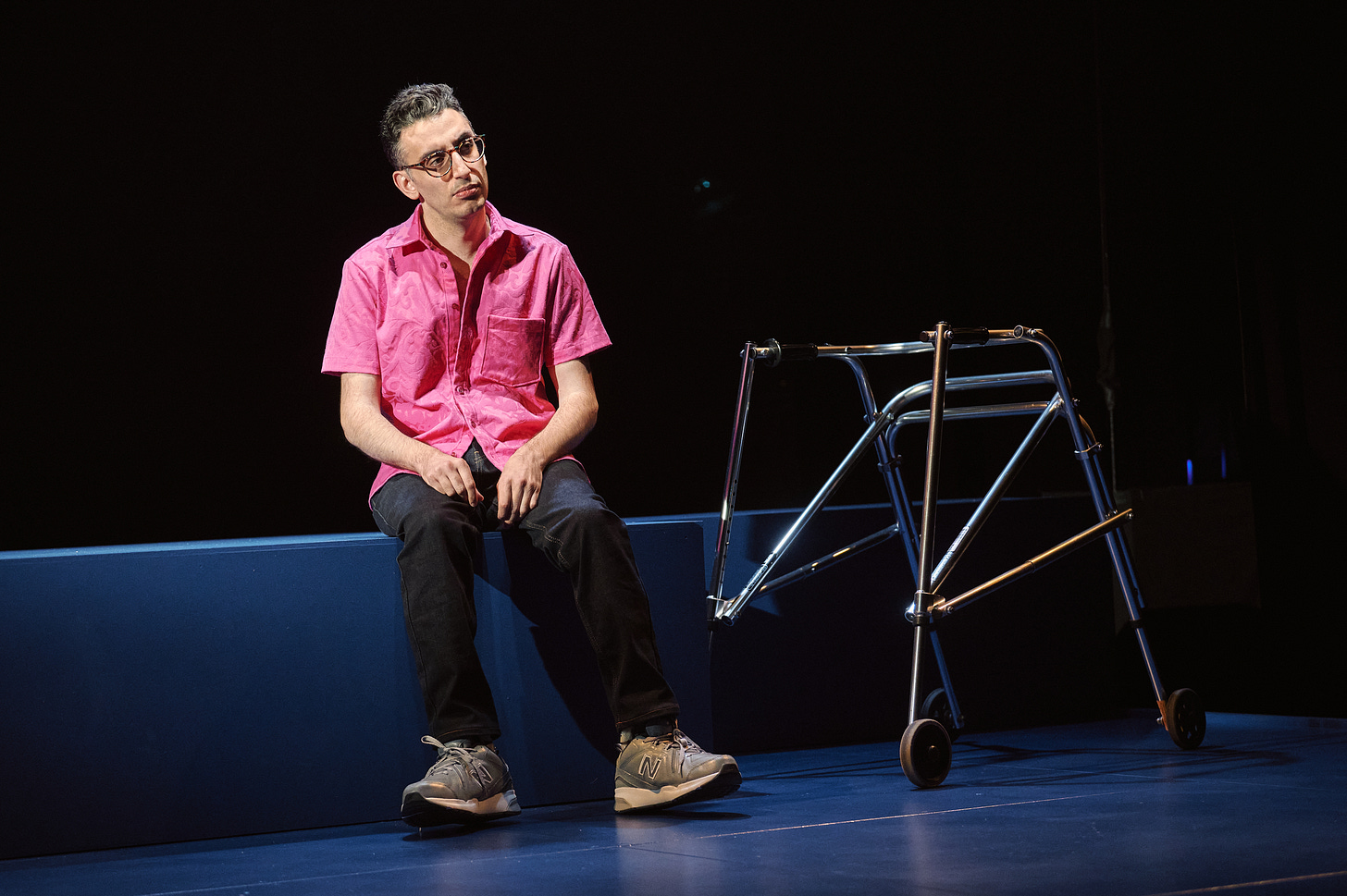Ryan J. Haddad on Heartbreak, the Need for Explicit Gay Sex, and Why You Should Know Disabled People Exist in Your World
“To fall in love sort of necessitates pain on the other end, no matter the duration,” says the writer and performer, who's latest play 'Hold Me in the Water,' is currently Off-Broadway.
I fully intended to have writer and performer Ryan J. Haddad answer our QLP Questionnaire after seeing his recent one-man show, Hold Me in the Water, in New York City last month. So many of the themes I’m interested in investigating—same-gender romantic love, platonic love and friendships, and the elasticity of queer relationships—are front-and-center in his theatrical work.
But Ryan is impossible to contain in such a format. He talks in bold statements that require a lot of italics, ALL CAPS and other emphatic punctuation. Example, his answer to the question of how he defines himself on the LGBTQ+ spectrum was: “Gay Gay Gay Gay Gay Gay Gay!”
He admits that his own writing process is also spontaneous and spurred by a bit of improvisation. “I just talk and, like, ‘Oh, I had no idea that I was going to say that!’”
When we spoke through a video chat, a week before the show closes Off-Broadway at Playwrights Horizons on May 7, he was frank about his hopes and needs and generous with his answers. I began by asking a sort of cheeky question about the fact that Hollywood has its dueling Canadian Ryans—Gosling and Reynolds—and we have our gay male disabled ones—Ryan J. Haddad and Ryan O’Connell—who share confessional stories about living with a disability (both have cerebral palsy) and searching for love. Many may already be aware of O’Connell’s book, I’m Special: And Other Lies We Tell Ourselves, and the TV adaptation, titled Special, which ran for two seasons on Netflix. It offers eye-opening moments about what it’s like to have sex as a gay man in the 21st Century.
Once we got going, I enjoyed the ride I was on—a lively conversation with Ryan about love, sex, and his hopes for the future.
This interview has been edited and condensed for clarity.
Jerry Portwood: I was really impressed with Hold Me in the Water. I hadn't seen your other previous shows, but I was really happy that I got to see this one. And you make quite an entrance—dressed in a glittery jacket from a trap door in the stage!
Ryan Haddad: Yes, it's partially due to glamour and partially due to accessibility. Even though there are some steps to get me up to the elevator I emerge from, it's the clearest path for me to the stage without coming through the audience.
JP: Now back to this idea of the dueling Ryans that I mentioned…
RH: It is not a rivalry. Ryan O'Connell has always been very kind to me since we first met. I mean, I learned that he existed first before he knew who I was. But since we've connected, he's always been so warm and so generous and supportive of my work. And I love what he has done in this sort of TV space, in the Hollywood space. Because I’m over here in New York Off-Broadway. It’s much different when your face is on a billboard or you're on the cover of [a magazine]. That's huge! And that's the visibility that the disabled community has been deprived of for a long time.
Also, we're not the only two. We shouldn't be the only two. We both happen to be named Ryan, and we both happen to be gay, male brunettes with glasses. The thing is that there's so much variation in the disability community or, more broadly, the deaf and disabled community, and all of those stories deserve to be told. And even if you're not explicitly telling our story, we can still exist inside of your world because we exist inside the world.
So I thank Ryan for opening a lot of doors. I describe this in Hold Me in the Water so explicitly—I just said the word explicit, you don't have to use that word…
JP: I think I know where you’re going with this and it was giong to be my next question!
RH: The reason I say “explicit” is because I fortunately or unfortunately read every single review and every single blog, no matter how big or small the outlet was, and a lot of people were like, “Why did he talk about sex so much? Oh my God! The sex was so graphic! I think maybe it was too graphic!? I'm a little uncomfortable.”
Well, it's all for a purpose. I'm grateful to Laura Collins, who's has now reviewed my last two shows back to back for the New York Times. I do think, therefore, she came in with a knowledge of me as an artist and was able to really beautifully articulate and understand what I and my team were doing in this show. So she wasn't going to squirm; she wasn't gonna be nervous.She knew that the sexuality had a purpose, and it was a really important purpose.
Whereas, in my earlier work, like my first play Hi, Are You Single?, I come right out and say, “Society completely desexualizes people with disabilities, therefore I'm working against that.” But I was 23 when I wrote it, and I'm 33 now. I didn't feel that I had to underline it and justify it. I just put a sex scene with a disabled person on stage, and it's not even a physical SCENE! I'm alone with my clothes on!
JP: Well, I thought it was really lovely, actually, because you did an elegant job of describing gay penetrative sex for people who don't understand how it even works.
RH: Maybe that's what they're uncomfortable with it. Maybe it is about the gayness of it. I can't help but wonder if it's also the coupling of the disability, too. But even so, by the end of the play, it should be a little more crystallized. It should become a little clearer to you that—even if it made you uncomfortable, by the end of the 70 minutes—you should understand part of the point of why.
Going back to Ryan O'Connell, I mean, I saw the first season of Special a year after my own experience with penetrative sex for the first time. The character is nervous about all the things that I was nervous about! And it brought me to tears. Because I had just lived it, and it was still feeling pretty raw, like emotionally. If I’d had that when I was a horny teenager, or when I was going off to college… Maybe if I had seen Ryan do that scene in 2011 versus 2019, I wouldn't have been so scared. I wouldn't have held back as much. It wasn’t a “how-to-guide,” but it was a piece of media that showed a possibility.
JP: Obviously, in the play, you explore what it was like having a satisfying emotional and physical relationship. I assume you haven't had another one since then? Or, if I can rephrase it: What is your ideal relationship status?
RH: Look, my play closes in a week, so it's like, how much do I care about giving away the ending versus giving you an honest interview? I am looking and hoping for a “Great BIG Romance” and wanting a long-term partner who will stick it out with me for the long haul. We can stick it out with each other! I mean, I come from a very supportive family that's predominantly heterosexual, but I have significant gay representation in my family as well. There are examples of partnerships that I hope to find, and I have not yet found. So the ideal is a long-term relationship that can turn into maybe a lifetime. But I also recognize that a lot of people take a step at that and don't end up with that being their life.
If you asked me when I was 22, or in college, if the possibility of not finding that forever person, you know, how that sat with me, I would have said that that's the scariest thing I've ever heard in my life! But I think, now I'm 33, and I really want that, and I believe that it will come—some version of that will come and that partnership can happen at any time in someone's life. But I've also seen people who I really love and respect have it, find it, and then it goes away! That person dies or they've been together for this decade, or this many decades, and then it dissolves. That doesn't invalidate it or what it was—or mean that the partnership wasn't there! So I think I have more perspective now that it could show up at any moment, and it could also go away at any moment.
JP: One thing that I was thinking when I was watching your show was, perhaps just as complex as knowing the needs of a partner who has a disability is being with somebody who's a writer. You mentioned that you told the guy you were dating, “I'm going to write about this.” I wondered what you thought about that. You have to find somebody who's willing to be a part of your life in that way as well—a subject in your writing.
RH: I'm glad that we're doing this conversation so that it can, you know, who knows what's going to come out of it… But you asked if I’d had a relationship since. None that were that impactful, none that were that significant or PROFOUND.
But I have. I've dated people since then and used what I gained and learned from that initial first major romantic experience and what I call my First Love. Because I take the lessons, and I've applied them going forward. You know what I mean? The ups and the downs. Just as a way of protecting myself and also not getting ahead of myself emotionally. … So I’ve saved myself a lot of pain.
But the “being a writer!” So it has come up in the dating of new people or even just first dates or guys I’ve chatted with online on an app and never ended up meeting in person. There's a little bit of fear of like, “I don't want to be in your next show.” Or there's this intrigue, this mystery or this intrigue: “What's he going to write about me? Is he going to write about me?” And the third prong of that is, like, a kind of ego: They assume, “I'm so special that he's absolutely going to do a whole 10-hour HBO mini series about me.”
JP: They wanna be Mr. Big to your Carrie Bradshaw!
RH: YES! And I mean, Carrie and Big went through a lot of ups and downs, and they ended up getting married and then he ended up dying! I mean, you want to point to fictional Carrie Bradshaw as the example, over 25 years, 20 years, it's like he died on a Peloton! Now Carrie is single in her 50s, and I am consuming every minute of Carrie being single in her 50s!
But also, that's where you could be in anyone's real life. So, just the awareness of—cherish every moment, anything can happen at any time. And, you know, you can't assume that somebody who's there today will be there tomorrow. Right? But it shouldn't, and so to fall in love, you can't assume that somebody who's there today will be there tomorrow.
To fall in love sort of necessitates pain on the other end, no matter the duration. But it doesn't mean that the love isn't worth it or worth pursuing or striving for.
JP: So what’s next for you as a writer then?
RH: I have one more sort of “big autobiographical play” at the moment that is about my family and my gay uncle and sort of gayness within our family. And, you know, I’m hoping against hope that that gets produced in a relatively short amount of time. I've been developing it for a while, but beyond that, at this point, I don't have another autobiographical piece in mind. I have a seed. I know what the next life event worthy of dramatization is, but I don't know what form that will take.
I believe in my soul that I will continue to return to the monologue and autobiography, and you'll be able to chart sort of “Ryan as a character” over the entirety of his life. I want that to happen. I think that, like, this is what I'm best at, and this is what I'm called to do. But it doesn't mean that I'm not going to go and do other things—because I also have to live the life in-between!
I have to have the life events that are then worthy of being dramatized. But eventually there will be a partner there who ends up being a significant character. Am I going to tell you every single beat of our first date and second date? I don't know.
In my fantasy, you know: Curtain goes up, and I'm five years into a marriage and you're like, “WHAT?!” I'm not sure. I'm not sure. That would be wonderful. That would be wonderful.








